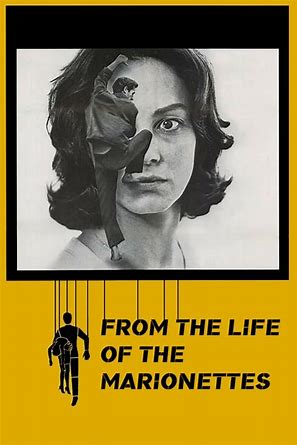From the Life of the Marionettes is one
of Ingmar Bergman’s most chilling films, infiltrated with a loathing and
pessimism that feel all-consuming: it was made during Bergman’s German exile
from Sweden, a period of great acknowledged personal difficulty, in which the
film feels helplessly suffused. It certainly feels like a deliberate stifling
of any lightness we might detect in his work, with for example a
protagonist called Egerman harking back to Smiles of a Summer Night (and
with another famous actress prominent in the structure), except that the smiles
here are heavy with malice and/or calculation, and the “little night music” becomes
a deadening disco-inflected grind; the film’s cheerless interiors generally
preclude any sense of day or night or any other index of the natural world. It
starts with Egerman’s murder of a prostitute, then goes back in dossier-like
fashion to place the event in a kind of context: we learn early on that he was plagued
by fantasies of killing his wife Katarina, with the doctor in whom he confides
these thoughts promptly summoning Katarina to his office, and then making
sexual moves on her (which seemingly come close to succeeding); almost every
subsequent scene provides a further moral or ethical or behavioral
transgression or atrocity or mark of trauma. It perhaps follows that Egerman
can gain a measure of control over his deadeningly repetitive, joyless life
only by embracing the extremity of depravity, placing himself beyond the pale;
the murder and his subsequent life in prison, removed from any knowledge of
what’s going on outside, are the film’s only sections in colour, contrasting
with the forcefully drab black and white of everything else. The film is highly artificial, its single-mindedness sometimes verging on parody; it causes you to
worry for the state of mind of its maker (or would do, if not for one’s
knowledge that Bergman’s next work was Fanny and Alexander), and for
your own.


No comments:
Post a Comment